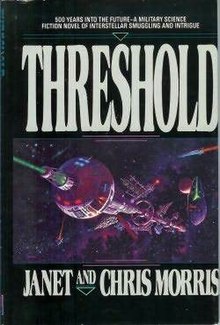
Threshold is, if I could condense my experience into one word, intriguing. Co-authored in 1990 by both Janet & Chris Morris, this sci fi title is a good blend of a mystery and adventure novel set in a sci fi world. It wasn’t quite what I was expecting when I found it on the shelves of my local Oxfam, but it entertained and left me wondering about the world, its characters and a few looming question presented by the book’s narrative.
I love to delve into book’s blind, with only the blurb as my guide, but on my initial read through of the book I wasn’t aware of it’s status as the first of three in a trilogy. That being said it became increasingly obvious that the book was the beginning point of a longer story – a story i’ve yet to complete – about half way through the narrative.
All in all, I enjoyed this book but it isn’t without it’s issues.
Starting with the positives
Right from the first few pages, the style of writing is enjoyable albeit straight forward. It doesn’t dance around topics, doesn’t feel drawn out and lengthy, but equally it doesn’t give you whiplash from scene to scene and chapter to chapter. The book has good pacing, much better pacing than most debuts for a trilogy which tend to slowly amp up into the meat and bones of the plot.
Considering this book was co-authored, the consistency of tone, word choice, and even the feel of a paragraph or page compared to the next is very well managed. The editor did a wonderful job! Granted, there’s no way to know to what extent each author contributed but the main takeaway is that – unlike some co-authored fiction i’ve read – it didn’t feel disjointed and the flow each chapter wasn’t choppy at all.
The plot had an interesting premise which is briefly explored in the early chapters and then only mildly referenced throughout the rest of the book. I am, of course, talking about the main protagonist’s (Joe South’s) arrival at Threshold via a faster-than-light travel experiment gone wrong. In fairness, the consistency of how this is written and how it plays into the over-arcing story is a great dynamic that doesn’t get old like you’d expect it to. There are times where this element drives the narrative in unexpected ways which is always welcome in a narrative that is primarily a mystery themed story.
The world building is also a highlight. The world of Threshold is diverse, unique, and – most importantly – believable to a degree. The writers do play with genre conventions and blur the line between science fiction and science fantasy – but it is pulled off well and doesn’t detract from the overall feel of the world they’ve created.
One plot-thread that was well intentioned and executed (I think?) was that of Muslim-like characters being denied their right to travel to the new Mecca. A significant portion of the plot revolves around the political discourse about the unjust nature of such a circumstance and – quite frankly – the inclusion of this presents a number of issues i’ll get into.
Over-looking the portrayal of Muslim-like characters (will get into that in more detail below) – the premise of sub-human humanoids and their rights is an important plot strand to talk about. This section was written well, detailed, and presented a lot of questions about the morality of how such beings should be treated, what rights they should have, and the ramifications of changing their ‘legal’ status. While it got a tad too political for a sci fi mystery/adventure, it wasn’t dragged out and helped develop some great storytelling.
However, we need to consider;
Where Threshold Exceeds it’s Threshold
While there’s a lot of good to be considered in this book, there are some things that left me scratching my head (time to talk about it). For instance, the portrayal of Muslim or Muslim-like characters is, to put it lightly, outdated. There seems to exist a focus on the exaggeration of extremist belief systems regarding Islamic faith which is very much put forefront and centre of the plot that – in my opinion – is very crude, simplistic and borderline sectarianist.
The blatant injection of slave-like ‘sub-human’ beings that are forced against their will to work for this group of Muslim-like people is a bit too much on the nose for me. In my opinion it takes the worst of Islam (the most violent, extremist sects imaginable in today’s world) and displays this as the norm in the future Threshold world. I got the impression the authors may have been trying to make a political statement with the book but I could be reading into it a bit too much (from a post/current ‘war on terror’ world). To keep with this theme, it is of course the Western-like characters trying to ‘free’ these sub-humans. At times, it felt like the book was a smokescreen for the age old ‘my ideology is better than your ideology’ argument.
Whether this is a product of its time or a product of the authors’ generational upbringing isn’t quite clear. What is abundantly clear is the negative light in which Muslim-like characters are portrayed which I feel is not only racist but sectarianist – but not within the confines of the narrative, which is why I dislike this book (and now, it’s authors).
As a brief note, I say Muslim-like when describing this religion or group of people as the novel is set 500 years in the future from present time. The belief system I am referencing in the book is clearly a nod to current day Islam. However, it is a nod to the most violent extremists of Islam that Muslims the world over denounce.
The only ‘positive’ portrayal of a Muslim-like character is that of a teenage girl that is the main protagonist of one of the plot strands weaved throughout the book. I say ‘positive’ in that the character is written well and the crude, simplistic and sectarianist feel I got from other Muslim-like characters isn’t present. However, it must be noted that the character in question is actively ‘denouncing’ her faith to fall in love with a boy (that is distinctly not from the same Muslim-like group of characters she is). It doesn’t take a stretch of the imagination to tie the ‘positive’ light in which this character is written with the denouncing of her religion to fall in love with a character that is portrayed as a character from this future’s western-like ideology. So, yeah. There’s that pesty old ‘my ideology is better than your ideology’ theme rearing it’s ugly head again.
My other gripes with this book are minor and barely worth mentioning, so I won’t, but the dialogue needs talked about. While there is a lot of decent dialogue and conversations between characters in the book, there’s some bouts of dialogue that miss the mark completely. The way the Muslim-like teenage girl speaks, or the way it is written, is reminiscent of Shakespearian dialogue (and not in a good way, in the corny, cheesy – please, please stop – kind of way). Likewise, the main protagonist’s dialogue flashes between strong and very, very weak. Some sections were mature reading, no doubt about it, but other sections felt like a badly written YA novel.
I was going to write a segment here on the unresolved plot points but, as this is a trilogy, there’s not really much of a point. However, I will say, it doesn’t standalone well as a book which (in my opinion) is a bit lazy and a bit money-grubbing. I feel like there should be some kind of conclusive ending to a book, even if it is in a trilogy or saga.
When it’s all said and done, it was a decent book – one that is worth reading if you have the time (and don’t mind the blatant political dick-swinging sub-text of the Muslim-like characters’ portrayal). But it’s certainly not one i’d put on a ‘must read’ list. It certainly won’t be picked up for a second read-through by me in a long, long time (if at all).
Read More From Lore
This science fiction book review was written by Stewart, the founder of Lore, based in Glasgow, Scotland. Stewart is an avid fan of science fiction, cosmic horror, science fantasy, and has recently started dabbling in high fantasy reading to pad out his drive for original, fantastic tales to delve into.
Be sure to:
- Check out Lore’s Blog for more reviews and articles
- Take a look at our sci fi flash fiction and sci fi short stories
- Or, if you want to browse our full selection, check out our short fiction depository
- Looking for more book reviews? Why not read Stewart’s review of Voyage To Venus by C.S. Lewis.
- Sci Fi writer yourself? Check out our list of 450+ Sci Fi words for writers!
- Blog of alien story ideas (50+ ideas)
